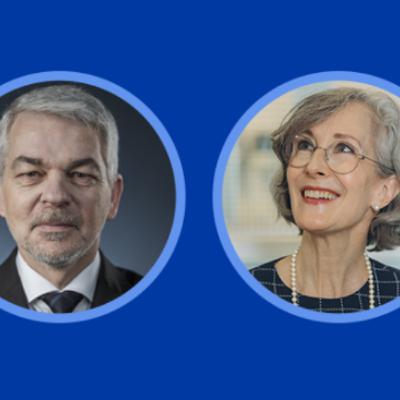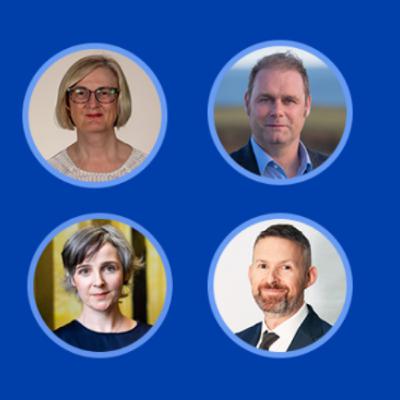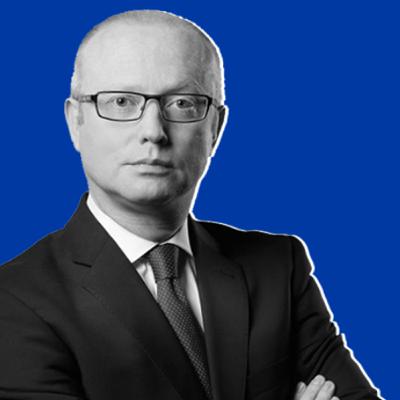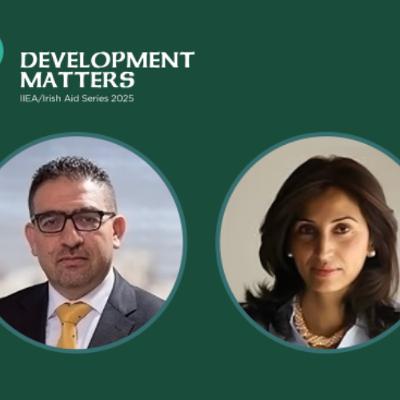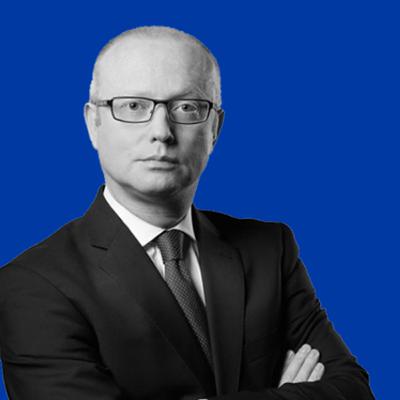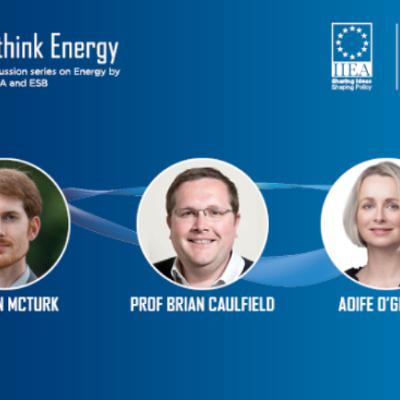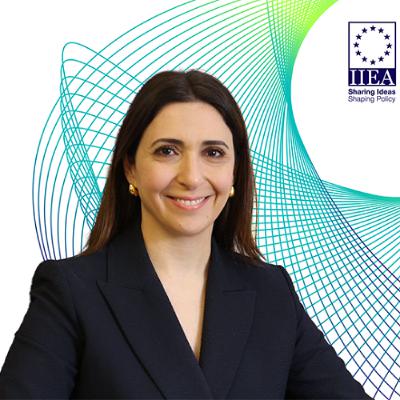Discover IIEA Talks
IIEA Talks

658 Episodes
Reverse
The European Security Architecture finds itself at a crossroads. After decades of reduced military spending in Europe, Russia’s war against Ukraine has reminded the rest of Europe of the relevance of its own security and defence capabilities which have long been considered to be obsolete, or taken for granted by the United States. But what if Russia’s attack on Ukraine and the rules-based international order succeeds? What implications would this have for European security, and how should European states prepare for such a scenario?
This event has been organised in conjunction with the Konrad Adenauer Stiftung (KAS), UK and Ireland
Speaker bio:
Professor Dr Carlo Masala is a renowned German expert on military and security policy. He holds the Chair for Security and Defence Studies at the University of the Bundeswehr Munich and has published extensively on international relations, NATO and European security. He is the author of the bestselling book ‘If Russia Wins’, published in 2025, which has topped charts across Europe and cemented his reputation as a leading voice in geopolitics.
As 2025 draws to a close, the IIEA’s Research Team looks to 2026, and Ireland’s EU Presidency. Barry Colfer and Cian FitzGerald discuss Ireland’s Presidency of the Council of the European Union. They discuss EU competitiveness, and how Ireland can contribute to Europe’s economic prosperity. Moreover, against the backdrop of Russia’s war in Ukraine, they discuss how Europe is supporting Ukraine, as well as the EU’s preparations for a widening of the conflict.
In his address to the IIEA, Derek Scally reflects on the German federal election of February 2025 and what it reveals about the shifting political landscape in Germany. Following the collapse of the Scholz government, the election delivered major gains for both the CDU/CSU and the far-right AfD, alongside historic losses for the former governing parties. With Friedrich Merz now installed as chancellor at the head of a new CDU/CSU–SPD coalition, Mr Scally assesses the implications for domestic governance, Germany’s role in Europe, and what political challenges may lie ahead in 2026.
About the Speaker:
Derek Scally is a native Dubliner, who studied at Dublin City University and the Humboldt University in Berlin, where he has been Irish Times correspondent since 2001. Covering politics, business and culture, he is a regular contributor to German news outlets, including Die Zeit weekly and Deutschlandfunk/WDR radio. He reports regularly from northern Europe and is also author of ‘The Best Catholics in the World’, published in 2021 by Penguin.
In this latest webinar in our series on Finland's Future’s Ecosystem, the panel takes an analytical approach to the ecosystem. They will give a critical assessment of the Finnish model and compare it with other international approaches, especially Ireland’s.
This webinar is the final event in a series that began with an address from Finland’s Minister for European Affairs Joakim Strand on Finland’s Futures Ecosystem in a European Context. The second in the series was an online panel event that outlined the core elements of Finland’s Futures Ecosystem.
This event was organised in conjunction with the UCD Centre for Innovation, Technology and Organisation.
Panellists include:
Elizabeth Canavan, Assistant Secretary General at the Department of the Taoiseach
Marc Ó Cathasaigh, former T.D.
Niamh Garvey, Senior Policy Analyst, NESC
Kevin Daly, Principal Officer at the Department of Finance
'Is Europe Ready for War?'
The Russian President has recently said he is ready for war with Europe. Is Europe ready for war with Russia? In this edition of IIEA Insights, The Economist’s Defence Editor Shashank Joshi, will assess the progress democratic Europe has made in deterring attack since the full-scale invasion of Ukraine in February 2022, which caused a sea-change in thinking about the threat of Russia. Other issues to be analysed will include how European countries assess the reliability of the US position on Nato’s Article 5 mutual defence commitment and the threats posed by China, directly via espionage networks and indirectly via its support for Russia’s war.
Shashank Joshi is The Economist’s Defence Editor. Prior to joining The Economist in 2018, he served as Senior Research Fellow at the Royal United Services Institute (RUSI) and Research Associate at Oxford University’s Changing Character of War Programme. He has published books on Iran’s nuclear programme and India’s armed forces, written for a wide range of newspapers and journals, and appeared regularly on radio and television. He holds degrees from Cambridge and Harvard, where he served as a Kennedy Scholar from Britain to the United States.
The situation in the occupied Palestinian Territory is starker than ever with famine, genocide, and entrenchment of an illegal occupation. In their address to the IIEA, Dr Ammar Dwaik and Diana Buttu contend that the destruction of Gaza and the ongoing expansion of settlements is erasing prospects for a two-state solution and violating the most fundamental rights of the Palestinian people.
They outline the current reality in Palestine, and its future, through the prism of human rights, and what needs to happen within Palestine and in Israel to advance rights and to secure a just and lasting peace. They also reflect on what countries like Ireland and the international community need to do to ensure the protection of fundamental rights, including the right of Palestinians to self-determination.
This event is part of the IIEA’s Development Matters Series which is kindly sponsored by Irish Aid.
About the Speakers:
Dr. Ammar Dwaik is the Director General of the Independent Commission for Human Rights in Palestine. He holds a Ph.D. in Social Policy and Management from Brandeis University (USA), a Master’s degree in Law and Government from the American University in Washington, and a Bachelor’s degree in Law from Yarmouk University in Jordan. Between 2004 and 2006, he served as the Executive Director of the Palestinian Central Elections Commission, where he oversaw the administration of the 2005 presidential elections and the 2006 legislative elections.
Ms. Diana Buttu is a Commissioner at the Palestinian Independent Commission for Human Rights (ICHR). She is a Palestinian lawyer with a Bachelor’s degree in Middle Eastern and Islamic Studies and a Master’s from the University of Toronto, a Ph.D. from Queen’s University Faculty of Law, and an MBA from Kellogg School of Management at Northwestern University. She previously served as a Legal Advisor to the Palestine Liberation Organization and was part of the team that brought the issue of the Israeli Wall before the International Court of Justice. Ms. Buttu is a regular commentator on Palestinian affairs for international media outlets.
The annual UN climate summit, known as the COP, recently took place in Belém, Brazil, on the edge of the Amazon rainforest. The COP30 talks took place at a time of increasingly fraught geopolitical relations – with the US absent. This resulted in a set of negotiating dynamics and multi-layered COP outcomes that were even more complex than usual.
In this webinar, Dr Simon Evans, senior policy editor at the climate news and analysis website Carbon Brief, will walk us through the key fights in Belém, the headline outcomes and what comes next for global climate action. For more background, the in-depth Carbon Brief summary of the talks is available here.
About the Speaker:
Dr Simon Evans is the Deputy editor and senior policy editor at the Carbon Brief, a UK-based website covering the latest developments in climate science, climate policy and energy policy. He holds a PhD in biochemistry from the University of Bristol and previously studied chemistry at the University of Oxford. He worked for the environment journal The ENDS Report for six years, covering topics including climate science and air pollution.
In his role as Minister of Economy and Finance of Greece, Kyriakos Pierrakakis has regularly called for the implementation of recommendations from the Draghi report in order for Europe to become further integrated and unlock the continent’s next phase of growth. In this fireside chat at the IIEA, Minister Pierrakakis discusses what the EU needs to get right in order to unlock new pockets of growth, as well as what the digitalisation of the EU’s economy means for the future.
About the Speaker:
Kyriakos Pierrakakis has served as Minister of Economy and Finance of the Hellenic Republic in Prime Minister Mitsotakis' Cabinet since March 2025 and is a Member of Parliament. Previously, he was Minister of Education, Religious Affairs, and Sports (2023-2025), where he initiated a series of reforms of Greece’s education system, most notably establishing a framework for private universities to formally operate in Greece for the first time and banning mobile phones in classrooms. As Minister of Digital Governance (2019-2023), he led Greece’s digital transformation, with the creation of the government portal gov.gr being the most notable initiative and one of the most popular reforms initiated in Greece. He has also served as the chair of the OECD's Global Strategy Group since 2021, a position he was re-appointed to in 2024. Minister Pierrakakis holds degrees from MIT (M.S. Technology and Policy), Harvard Kennedy School (Master in Public Policy), and Athens University of Economics and Business (B.S. Computer Science).
The European Commission’s publication of their recommendation on “Increasing the Availability of Savings and Investment Accounts with Simplified and Advantageous Tax Treatment” on September 30th marks an important milestone on the EU Savings and Investment Union journey. As a leading European funds and asset management centre, Ireland has a key role to play in this significant development in the European asset management industry – but a roadmap will be necessary if the potential of this initiative is to be realised.
This event discusses the practical steps – and challenges – in establishing Savings and Investment Accounts across the 27 member states of the EU and the important role of the Irish funds and asset management industry in this step-change in EU savings and investment culture.
This event features a keynote address from John Berrigan, Director General of DG FISMA. The event also includes a panel discussion including John Berrigan as well as:
Seán Páircéir, Partner and Global Head of Investor Services at Brown Brothers Harriman
Jonathan Cleborne, Head of Europe at Vanguard
Susan O'Reilly, Head of Funds, Markets and Securities, Financial Services Division - Department of Finance.
Dr Orlaigh Quinn, (Moderator), Former Secretary General of the Department of Enterprise Trade and Employmen
'Ireland-US Relations in Crisis?'
The return of Donald Trump to the US presidency in January 2025 marked a dramatic change in America’s posture towards allies and adversaries alike. For Ireland, this has manifested in the unilateral imposition of tariffs, criticism of the scale of U.S. pharmaceutical manufacturing taking place in Ireland, and the fining of US tech companies for breaches of EU rules. Separately, unprecedented salvoes of public criticism of Ireland from US lawmakers over the Occupied Territories Bill have taken place along with wider criticism of Ireland for free riding on U.S. security guarantees and acting as a tax haven for US corporations. Former special assistant to President Joe Biden, Tom Wright, joins IIEA Insights to discuss the current state of Ireland-US relations and how relations might play out over the remainder of the Trump presidency.
Thomas Wright, currently a senior fellow with the Strobe Talbott Center for Security, Strategy and Technology at the Brookings Institution, served as special assistant to the president and senior director for strategic planning at the National Security Council in the Biden Administration. At the White House, Tom worked on a wide range of projects and issues, including the 2022 U.S. National Security Strategy, the Russia-Ukraine war and European security, U.S.-China relations, the global south, foreign economic policy, and countering the growing alignment between U.S. adversaries and competitors (China, Russia, Iran, and North Korea). He is also an author and contributing writer to the Atlantic.
As Ireland advances towards its 2030 and 2050 climate goals, transforming how people and goods move will be essential. The final event in the 2025 ESB REthink Energy series explores the future of transport and the growing role of electric mobility in achieving a cleaner, smarter, and more connected system. The discussion examines the evolution of battery technologies, the electrification of public and private transport, and the development of the infrastructure required to support widespread adoption of electric vehicles. The panellists also consider how policy, innovation, and consumer behaviour can drive Ireland’s transition towards a sustainable and resilient transport network.
This event is part of the IIEA’s REthink Energy series, organised in partnership with ESB.
Panellists:
· Dr Euan McTurk, Consultant Battery Electrochemist, Plug Life Consulting Ltd (Keynote Address)
· Professor Brian Caulfield, Professor in Transportation at Trinity College Dublin
· Aoife O’Grady, Head of Zero Emission Vehicles Ireland, Department of Transport
Space assets are increasingly important for national prosperity and resilience. This panel discussion highlights the role of space in supporting communications, transport, financial transactions, and other critical services necessary for daily life. This panel, drawing on practitioners and policy experts, also discusses space and other policy frameworks to ensure that Ireland can continue to remain resilient and prosperous at a time of growing tension.
This event has been organised in conjunction with the Embassy of Canada
About the Speakers:
Kealan McMoreland, Head of the Office of Emergency Planning at the Department of Defence
Dr Norah Patten, Aeronautical Engineer, Bioastronautics Researcher, and will be Ireland’s first astronaut
Dr Shawna Pandya, Emergency and Aeromedical Transport Physician, and Canada’s first commercial female astronaut
Fintan Buckley, Co-founder and CEO of Ubotica
The fourth podcast in the 2025 F.E. podcast series was an interview with Thomas Byrne, Minister of State for European Affairs and Minister of State for Defence, by Barry Colfer, Director of Research at the IIEA in Dublin. The podcast is part of the Future-proofing Europe Project which is kindly funded by the Department of Foreign Affairs.
The theme of the podcast was Ireland’s Presidency of the Council of the EU in the second half of 2026. Minister Byrne commenced the interview by describing his long-standing experience and interest in European Affairs and explained the roles and responsibilities of the Presidency which include chairing a wide range of meetings at every level in Dublin, Brussels and Luxembourg and representing the EU and the Member States at various international summits during the term of the Presidency.
At domestic level, several government departments are already working on the administrative arrangements and preparations needed to run an efficient and impactful Presidency and to find consensus on policies of major import.
As to the public visibility of the Presidency, he said it would mainly be capture by the arrival of EU leaders for an informal European Council and for a meeting of the European Political Community, (EPC) in Ireland during its Presidency with leaders from up to 47 European countries. A further 22 informal Ministerial meetings, a quarter of which would be held outside Dublin, and 250 other working group meetings would be hosted around Ireland led by civil servants and Ministers. They would complement the work of the Committee of Ambassadors to the EU, (COREPER) in meetings in Brussels and Luxembourg.
The Minister said that he had opened a consultation portal to elicit citizens’ views on what Ireland’s priorities should be, and to invite them to suggest a theme for Ireland’s Presidency. He expressed a strong interest in engaging the public interest in the Presidency.
In terms of Presidency priorities, he said that some are already part of the ongoing legislative agenda in the EU and will need to be advanced. Others will derive from the agreed Presidency trio programme which involves the Irish, Lithuanian and Greek Presidencies over an 18month period, the purpose of which is to maintain continuity and consistency across the three Presidencies. As to likely priorities, which will be formally announced in June 2026, the Minister mentioned values, such as democracy and rule of law, competitiveness, the Single Market and simplification agenda, security and defence, the MFF and Enlargement.
As well as capturing the imagination of citizens the main objective then would be move forward as an honest broker representing the voices of all Member States and to see where Ireland can have an impact on shaping the agenda and achieve consensus on major portfolios, all of which would enhance the reputation of the country, both from an administrative and diplomatic point of view.
In her speech, Minister Raouna acknowledges that enlargement has long been one of the EU’s most powerful transformative tools, and a driving force for reforms, progress, security, and prosperity. She discusses how the EU is navigating an increasingly complex geopolitical landscape in the face of Russia’s ongoing aggression against Ukraine. She also argues that it is clear that enlargement is a geopolitical investment and necessity for stability, peace, and security for the European Union.
It is widely accepted today that Enlargement has gained new impetus, and that this is a clear statement that Europe’s response to aggression lies in greater European unification, and deeper integration. According to Minister Raouna, Enlargement also re-emerges as a key policy for strengthening the EU’s strategic autonomy and global influence. She calls for the current momentum for enlargement to be seized, pointing out that by integrating new partners, the EU will reinforce its collective security and capacity to respond to emerging challenges. She concludes by underscoring that the incoming Cypriot Presidency of the Council of the EU is committed to driving forward the EU’s enlargement agenda with ambition and a results-oriented approach based on merit.
About the Speaker:
Marilena Raouna is the Cypriot Deputy Minister for European Affairs, in charge of the preparations and political oversight of Cyprus’ Presidency of the Council of the EU in the first half of 2026. She studied Jurisprudence (Law) at Oxford University, holds an LLM in Public International and European Law from the London School of Economics and Political Science (Chevening Scholar) and a Diploma in French language and civilization from Sorbonne University.
The UK is confronting a series of interlinked challenges - domestic, international, political and economic. This lecture by UK in a Changing Europe Director Anand Menon will explain what these are and how they interact.
Speaker bio:
Anand Menon is Director of the UK in a Changing Europe and Professor of European Politics and Foreign Affairs at King’s College London. He has written widely on many aspects of EU politics and policy and on UK-EU relations. He is a frequent contributor to the media on matters relating to British relations with the EU.
Originally recorded on the 6th of November 2025
Since the Global Financial Crisis, central banks have made significant changes to their monetary policy operating frameworks. Notably, the Federal Reserve and other central banks have expanded their balance sheets, altered their reserves regimes, and adopted new tools to set their policy rates. President and CEO of the Federal Reserve Bank of San Francisco, Mary C. Daly, discusses the costs and benefits of conducting policy under different regimes.
About the Speaker:
As President of the San Francisco Fed, Ms. Daly serves the Twelfth Federal Reserve District in setting monetary policy. Prior to her current role, she was the executive vice president and director of research at the San Francisco Fed, which she joined in 1996.
Ms. Daly has served as an advisor to the Congressional Budget Office, the Social Security Administration, the Institute of Medicine and the Library of Congress. She has also been a visiting professor at Cornell University and the University of California, Davis. Ms. Daly holds a Ph.D. in economics from Syracuse University, an M.S. degree from the University of Illinois at Urbana-Champaign, and a B.A. from the University of Missouri-Kansas City.
The United Kingdom has set an ambitious target to achieve a decarbonised power system by 2030 as part of its broader Net Zero commitment. Delivering on this goal is central to strengthening energy security, enhancing resilience, and ensuring affordable, clean power for households and industry. In his address to the IIEA, Chris Stark, Head of the UK Government’s Mission for Clean Power, outlines the UK’s pathway to Net Zero and discuss the role of interconnectors, infrastructure, and investment in delivering a secure and sustainable energy system. Drawing on his leadership of the UK government’s “Mission Control” for clean power, Mr Stark also reflects on the challenges and opportunities of transforming the UK’s energy landscape amid an increasingly complex global environment.
This event is part of the IIEA’s REthink Energy series, organised in partnership with ESB.
Speaker bio:
Chris Stark was appointed head of the UK’s Mission for Clean Power in the UK’s Department for Energy Security and Net Zero in July 2024. Previous to this, he was Chief Executive of the Climate Change Committee from April 2018 for six years. Under his leadership, the committee recommended a UK net zero target for greenhouse gas emissions by 2050 – a target that is now in law. He was Director of Energy and Climate Change in the Scottish Government from May 2016 to April 2018. He has also served as Chief Executive of the Carbon Trust and is currently Honorary Professor at the University of Glasgow’s Centre for Public Policy, a Fellow of the Royal Society of Edinburgh, and is on the board of climate charity Murmer.
In his remarks to the IIEA, Thant Myint-U reflects upon the future of world peace and the United Nations. Through the lens of his new book Peacemaker: U Thant, the United Nations, and the Untold Story of the 1960’s, Thant Myint-U explores safeguarding global peace, preventing great power war, and reimagine the United Nations. In his book, Thant Myint-U tracks the history of U-Thant, the first UN Secretary-General of colour, who became the Cold War era’s preeminent ambassador of peace, and played a crucial role in preventing conflict such as during the Cuban Missile Crisis. His remarks will reflect not only upon the events of the 1960’s, but the lessons which U-Thant’s tenure may offer us now during a moment of escalating global tensions.
About the Speaker:
Dr Thant Myint-U is an award-winning author, historian, and international public servant. He has written five books, most recently Peacemaker: U Thant and the Forgotten Quest for a Just World (forthcoming September 2025). He was educated at Harvard and Cambridge Universities and taught history for several years as a Fellow of Trinity College, Cambridge. He has also served on three United Nations peacekeeping operations (Cambodia 1992-3 and the former Yugoslavia 1994-6) and from 2000-2007 at the UN Secretariat in New York. From 2011-2021, he helped lead reform efforts in Myanmar, including as a presidential adviser, the Founding Chairman of the Yangon Heritage Trust, and the Chairman of U Thant House. He currently lives in Cambridge and is an Honorary Fellow of Trinity College.
A Keynote address by Martin O'Malley
About the Speaker:
Martin O’Malley is a former Mayor of Baltimore and a former Governor of Maryland. Most recently, he served as President Biden’s Commissioner of Social Security. He is also a Patron of the Killarney Global Economic Summit 2026.
As a public servant and top executive, Martin O’Malley has pioneered a new way of performance-driven government at all levels including local, state, and national. Having worked for Grant Thornton, Guidehouse Advisories and a number technology companies, O’Malley brings a blend of private and public sector experience to some of the greater challenges facing humanity the world over.
His accomplishments in public service include putting Baltimore on the path to the largest ten-year crime reduction of any major city in America; enabling Maryland’s public schools to rank first in the US for five years in a row; and reversing a 300-year decline in the health of the waters of the Chesapeake Bay - the largest estuary in North America.
Martin O’Malley has taught at several leading universities in the US including Boston College, Harvard, Georgetown, Boston College Law, the University of Indian Kelley, Johns Hopkins Carey School of business. He is the author of Smarter Government — how to govern for results in the Information Age.
In his remarks, the Director General of the EU Military Staff (DG EUMS) will underline the need for a more strategic, coherent, and adequately resourced Common Security and Defence Policy (CSDP). He will stress that EU military missions and operations are effective only when guided by a shared political vision among all twenty-seven Member States and aligned with the priorities of Host Nations. He will highlight the importance of developing an Integrated Campaign Plan to ensure coherence across all EU instruments and closer coordination with international partners. Finally, he will emphasise that under-resourcing and limited participation undermine effectiveness, and that genuine political will must translate into collective responsibility and tangible contributions to safeguard the EU’s credibility as a reliable security partner.
Speaker bio:
The Director General of the EU Military Staff (DG EUMS) is the European External Action Service’s (EEAS) senior military adviser and the principal source of its military expertise. He directs the EU Military Staff (EUMS), providing military advice and expertise to EU institutions. In a dual-hatted capacity, he also serves as Director of the Military Planning and Conduct Capability (MPCC). As DG EUMS, he oversees early warning, situation assessment, and strategic planning for EU military missions, ensuring the effective operational planning and conduct of non-executive missions through the MPCC. He further supports crisis management, capability development, and maintains close coordination with the European Defence Agency (EDA).


